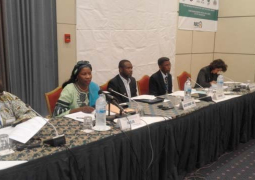Bien venue to another educating and fun read of Bring it on! I felt like I would be very selfish if I didn't share this wonderful and educating piece of information with my beloved readers which my younger sister did share with me when she returned home from her trip to
We all know our planet's climate is changing. Temperatures are increasing, glaciers and ice sheets are melting and sea levels are rising. Scientist now agree that the increasing amount of carbon dioxide (C02) and other greenhouse gases released into the air from human activities are contributing to these changes in our climate. We all need to take action to prevent further changes and protect our environment and wellbeing.
852 million people do not get enough to eat every day. 200 million children under five years of age suffer from acute or chronic malnutrition. Hunger and malnutrition cause immeasurable suffering to millions of families and result in poor health, lost learning potential, lost productivity and income, and high medical and household expenses.
1. Food: provides us with the energy and nutrients our bodies need for growth, repair, physical activities and resistance to disease. Climate change could become a major threat to world food security, as it has a strong impact on food production, access and distribution. Especially at risk are developing countries, which are highly dependent on agriculture and have fewer resources and options to combat effects of climate change and damage caused from extreme events.
2. Water: Nothing on Earth can live without water. Seventy per cent of the Earth is covered by water, but only 2.5 per cent of it is fresh; the rest is saltwater. A person needs 2-4 litres of drinking water a day. Worldwide, agriculture accounts for 70 per cent of all fresh water uses, industries accounts for 22 per cent and domestic use for about 8 per cent. One- sixth of the world population doesn't have clean water and two-fifth don't have toilets. Climate change is an additional threat; it is expected that 3 billion people will face water shortage and 100 million people will be more at risk from coastal flooding.
3. Land: is necessary for most rural families to have a sustainable way of producing food and earning income. Difficulties in owning or renting land often contribute to food insecurity and poverty. Climate change including extreme events such as storms and floods is making it even more difficult to grow and harvest produce from the land.
4. Forests are home to hundreds of species of mammals, birds, reptiles, thousands of insects and plant species.
5. Harvesting: forests products is important to the livelihood of millions of people living in or near forests. Forests produce oxygen, use carbon dioxide and ensure water and soil conservation. When forests are cut down or burned, carbon dioxide is released, and the home for many plants, animals, insects and other creatures is lost.
6. Biodiversity refers to the variety of all living things on our planet and the patterns they form. It includes the differences between species, the difference within species, and the range of habitats in which they live. Many human activities have a negative effect upon Biodiversity. Plants and animals live in certain climatic conditions, preferring certain temperatures and a certain amount of rain. If these amounts change the species may not survive in that area.
7. Fisheries support around 200 million people worldwide. Fish is a good source of protein, minerals and essential fatty acid and is an important part of the diet. Fisheries are extremely vulnerable to pollution, habitat destruction and other forms of environmental loss. Temperature changes in the oceans could affect the fish stocks on which many communities depend for their survival.
8. Millions of people are affected by natural disasters: for example droughts, floods, earthquakes, hurricanes, fires and pests. Every year, there are 30-40 countries in crisis situations, needing outside assistance to cope with critical problems of food insecurity. Climate change phenomena such as sea level rise, increases in temperature, reduced water availability and extreme events such as heat waves, floods and cyclones have dramatic effects on the land and local environments.
9. Seven out of ten of the world's hungriest are women and girls. Women are particularly affected by the risks of environmental damage. Poor women tend to rely more than men on natural resources, so when these are directly hit by climate change, women's livelihoods will also be affected. Depletion of natural resources would put additional burden on women, who would be forced to go longer distances in search of firewood and water. With women's key roles and responsibilities in feeding, providing care and producing food for the family, their rights are essential to ensuring food security.
10. Every person has the right to food. It means that all people have the right to feed themselves and their families with dignity. People must be able to grow or hunt or catch the food they need or earn enough money to buy it. Fulfilling the right to food means ensuring that people have the knowledge, skills, resources and opportunities to get food for themselves. It also means that when people, for reasons beyond their control, are not able to feed themselves, they still have the right to food and they must be helped until they are able to feed themselves again. Governments must do everything possible to make sure that all of their people are free from hunger and have access to good quality and safe food.
Time to Think and Act!
All members of society - individuals, families, local communities, civil society and private businesses have responsibilities in securing, planting and protecting the right to food for the local and global community. Why wait for them to take the initiative in protecting our environment? It starts with you so act now!
Read Other Articles In Article (Archive)



